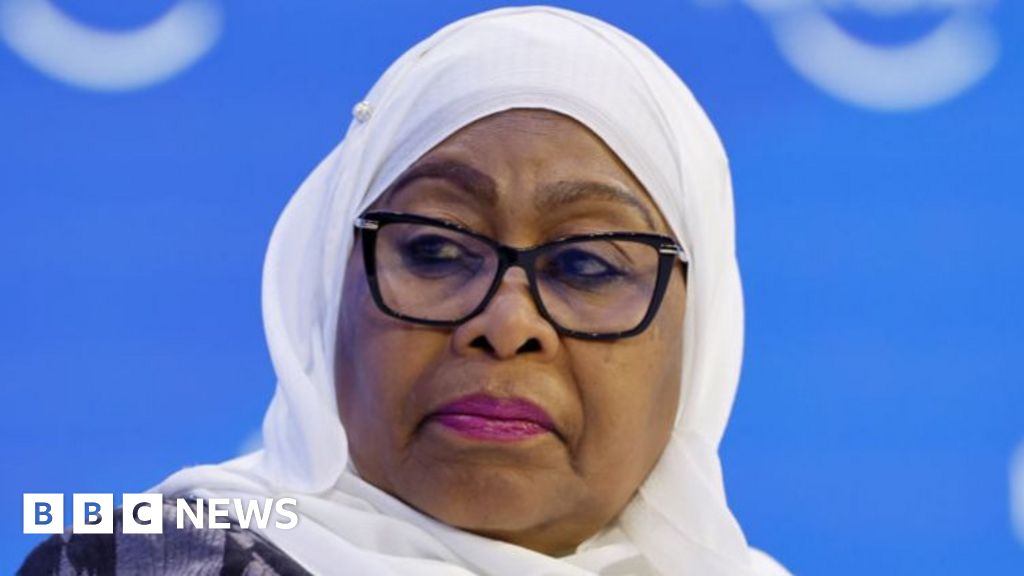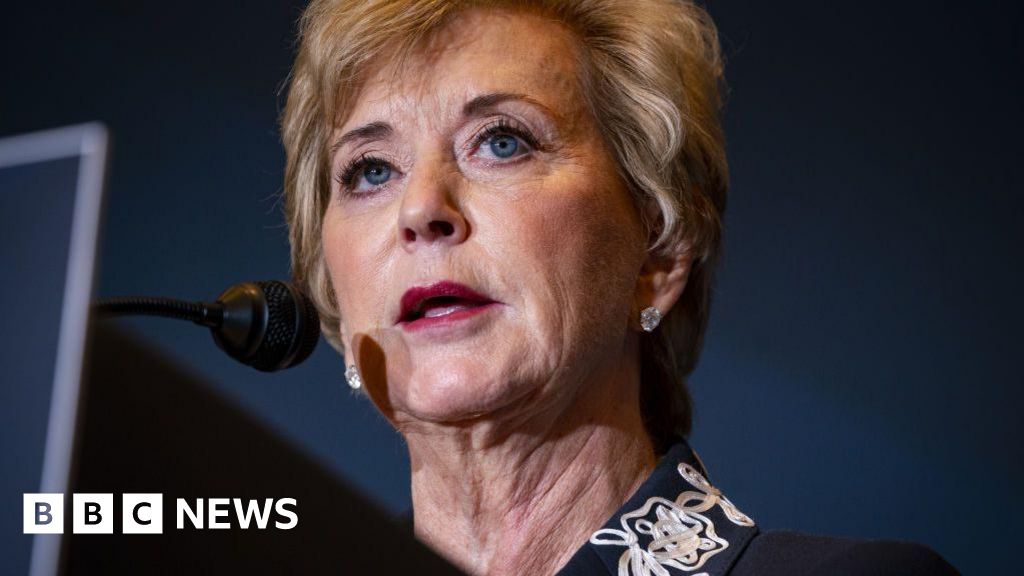BBC News in Lusaka
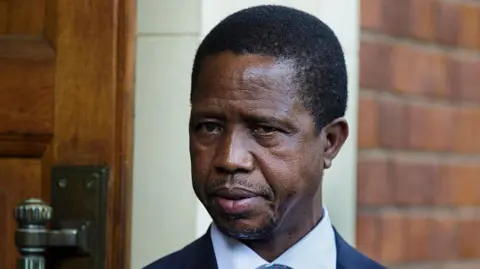 Getty Images
Getty Images“It’s coming home!” – a phrase indelibly linked to English football fans – has now gained currency among some Zambians in the battle over what to do with the body of former President Edgar Lungu.
The 68-year-old died two months ago in South Africa where he was being treated for an undisclosed illness.
In the latest episode of what is now a full-blown saga, a Pretoria court ruled in the Zambian government’s favour, saying that in the public interest, Lungu’s remains can be repatriated and given a state funeral, against the wishes of the family.
The decision triggered celebrations among some governing party supporters, who shared Facebook posts with the phrase: “It’s coming home,” as if Zambia had won a trophy.
An undignified response, perhaps, but it has come to symbolise how divisive and partisan this has become.
For some, who are fed up with the row, the sorrow and grief that came with Lungu’s passing have faded into feelings of fatigue.
But despite a host of more pressing economic problems, public discussions continue to be dominated by the fallout from the death of the former president, who led the country for six years from 2015.
The seeds of the controversy were sown in the feud between Lungu and his successor – the man who soundly beat him in the 2021 election – Hakainde Hichilema. But it has now spiralled into a row laced with wild accusations of witchcraft.
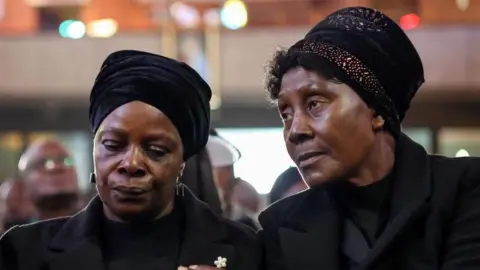 Reuters
ReutersWhen the judge in South Africa made his ruling last week, the ensuing anger from Lungu’s older sister was telling.
Bertha Lungu burst into a fit of rage, crying uncontrollably as she hurled unsavoury words at Zambia’s Attorney General Mulilo Kabesha, who was also present in court.
“Kabesha, Lungu is not your father’s son… he’s not Hakainde’s son… This is really painful. I don’t want to go to Zambia,” she cried as people, including her niece, Tasila Lungu, struggled to comfort her and cover her mouth.
The body has not yet been repatriated to Zambia because the Lungu family is appealing against the South African judge’s decision – a case that has been postponed from Friday to Monday in order to give the two sides more time to talk.
This was all supposed to have been settled in June, when the family initially agreed that there could be a state funeral in Zambia. But the plans were scuppered over a dispute about what role President Hichilema would play.
Lungu’s family said one of his dying wishes was that Hichilema should not go anywhere near his body.
The key to understanding the animosity was the more than 100 days that Hichilema, opposition leader at the time, spent in detention in 2017, awaiting trial on treason charges.
He was accused of endangering the life of then-President Lungu after his motorcade allegedly refused to give way to the one transporting the head of state.
The charges were only dropped after the intervention of the secretary general of the Commonwealth. This was one of several times that Hichilema was arrested while he was in the opposition.
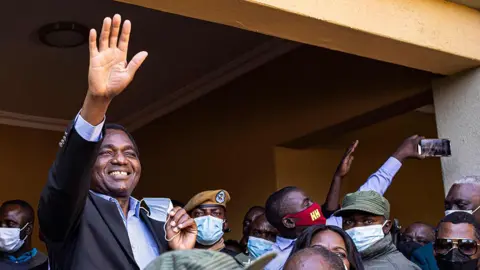 AFP via Getty Images
AFP via Getty ImagesIn turn, the Lungus have alleged persecution under Hichilema. Tasila and the former president’s widow, Esther, continue to face corruptions charges, which they deny.
Lungu’s family have vowed that they are prepared to wait for the court process as long as it takes to ensure he receives a burial they consider dignified, even if it means stalling the process, according to their spokesperson Makebi Zulu.
They insist that while they were open to burying Lungu in Zambia, they want to honour his wishes that Hichilema should not attend the event.
But the authorities are adamant that the former president should be accorded a state funeral to be attended by his successor and given a proper send-off as a former president.
The government, through the attorney general, has even indicated Lungu may have to be buried without the family’s involvement.
“If they want to set a precedent, let them give us reasons why the current president should not go near the casket. And who has told them that he wants to be near the casket, anyway?” he told the state broadcaster ZNBC.
“We are ready as government to discuss with the family, we will never ignore the family unless the family just walks out… but the family has a right to say: ‘We are not coming, we are not part of it.’ Then we will proceed and bury without them.”
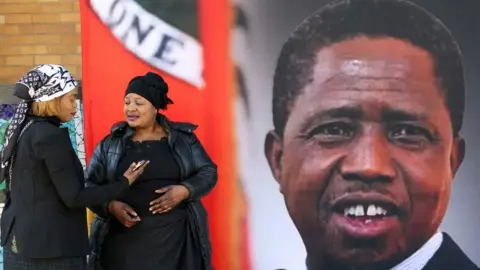 Reuters
ReutersThere is no Zambian law that stipulates how former presidents should be buried.
Traditionally, all ex-leaders have been accorded state funerals and buried at Embassy Park, which is specifically reserved for them.
Sishuwa Sishuwa, a Zambian historian and senior lecturer at South Africa’s Stellenbosch University, strongly disagrees with the idea that Lungu could be buried without his family’s involvement.
“Such reckless statements are culturally insensitive, undermine the government’s claims that its actions are motivated by the desire to accord Lungu a dignified burial, and indicate that political considerations rather than public interest are the key drivers at play,” he told the BBC.
“The failure by Hichilema to rein in on the unruly conduct of his officials and supporters has fed public perception that the president approves of such conduct and consequently heightened divisions.”
He argues that had Hichilema publicly indicated that he would stay away from the funeral, Lungu would have been buried long ago.
Dr Sishuwa says that the authorities’ determination to take the body of Lungu from the grieving family – in the name of giving him a dignified funeral – has not only worsened political divisions but has also fed the belief that the body may be wanted “for occult reasons”, in a country where the belief in witchcraft is widespread.
Nevers Mumba, the leader of the Movement for Multiparty Democracy, which is in a political alliance with Hichilema’s party, has defended the president.
“What drives [the president] is not obsession, but a deep, deep sense of duty. Hakainde Hichilema never gives up on anything he pursues as long as he believes he is doing the right thing,” Mumba, who is also a pastor, wrote on his Facebook page.
“He fights, with a clear conscience till the end, and he keeps on refining his methods until he gets it right.”
How long this fight will go on for is not known, but several episodes of the saga are yet to be written.
Zambians may shrug and try to focus on other matters, but they will still get drawn into the debate about whether the body should “come home”.
More about Zambia from the BBC:
 Getty Images/BBC
Getty Images/BBC

